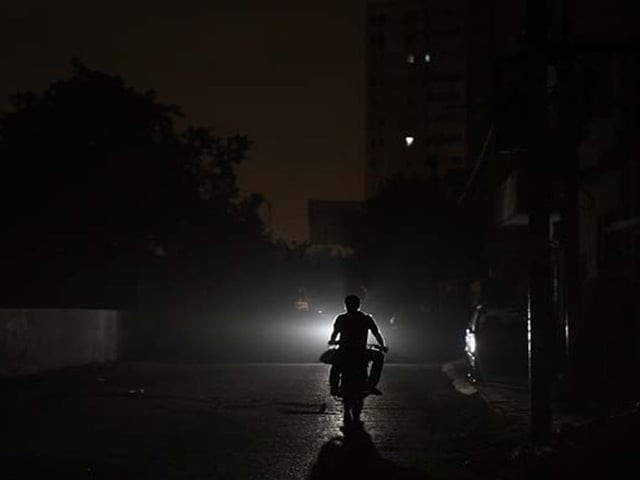Human error caused Jan 9 blackout: report
SOPs not followed during maintenance working, NA panel told

The Power Division has informed a parliamentary panel that an inquiry committee probing into last month’s countrywide blackout has held some Guddu Thermal Power Plant officials responsible.
“The problem occurred due to a human error at the Guddu power station. The error led to the tripping of the entire power system. The fault occurred as some officials did not follow SOPs [standard operating procedures] during maintenance work,” said Secretary Power Ali Raza Bhutta on Monday.
Bhutta was briefing the members of the National Assembly Standing Committee on Energy.
“Due to a mistake, the Guddu Thermal Power Plant tripped and there was a complete blackout. At the time of the blackout, the power consumption in the country stood at 10,000 megawatts,” he added.
Pakistan on January 9 plunged into total darkness after the National Transmission and Despatch Company (NTDC) power system encountered a major breakdown due to the tripping of the Guddu Thermal Power Plant at around midnight.
The blackout also partially disrupted the telecommunication system in the country and people from different cities and towns reported a massive drop in mobile phone signals. Initial reports had suggested that Guddu Thermal Power Plant’s power system developed a technical fault.
“This caused tripping of high transmission nationwide and brought down the system frequency from 50 to zero in less than one second. The drop in infrequency caused tripping of power stations nationwide," Federal Minister for Power Omar Ayub Khan had posted on his official Twitter handle.
Following the incident, the NTDC had constituted a four-member committee to probe into the reasons and facts leading to collapse of the power system and determine the responsibility. The committee was also to suggest measures to prevent occurrence of such incidents in future in 7 days.
In view of a preliminary inquiry, the Central Power Generation Company had also suspended seven of its employees working under Plant Manager-III for alleged negligence.
According to the power secretary, the Power Division had received three reports on the blackout. He told the panel that the Power Division would submit these reports to the federal cabinet.
He said apart from the Guddu Thermal Power Plant officials, the inquiry committee had also nominated those responsible for not improving the NTDC system. “The inquiry committee has proposed to take measures to ensure that failure of one plant does not trip the entire system in future.”
Briefing the NA committee, K-Electric officials said losses in Karachi, the country’s economic hub, have dropped from 36% to 19%. They claimed that 75% of the city is load shedding free. Soon the city will be 95% load shedding free. A 900-megawatt unit will be operational in May, the K-Electric officials said.
No sweeping powers for Power Division
The parliamentary panel also refused to give sweeping powers to the Power Division to impose surcharges on the electricity consumers as it decided to defer amendments in the National Electric Power Regulatory Authority (Nepra) Act.
The bill proposed empowering the government to impose surcharges on the electricity consumers.
At present, the consumers pay different surcharges – like tariff rationalization surcharge and financial cost surcharge – to pay for the cost of inefficiencies of the power distribution companies. The consumers have also been paying Neelum Jhelum surcharge which is going to be abolished next month.
Earlier, Power Secretary Ali Raza Bhutta said there is a uniform tariff policy across the country.
“The federal government would make changes in tariff policy only with the approval of the Council of Common Interests (CCI),” the secretary said, adding that policymaking is the prerogative of the CCI.
“The current law about tariffs needs some clarifications which the government is making,” he said, adding that the government is also determining the term of Nepra decisions.
“If the government should impose a surcharge, it should have the power. The government will have the power to impose surcharges in two terms. The government would be able to impose a surcharge for public sector power projects only,” he said.
The committee chairman raised the question whether the government would be able to impose surcharges like late payment surcharge to recover the cost of “incompetence and inefficiency” from the consumers.
Shazia Marri, a committee member, expressed serious concerns over absence of the law secretary. She also opposed the imposition of surcharge. The committee chairman said the government is obliged to make amendments ensuring public interest.
“We are scared of the word surcharge,” Ghulam Bibi Bharwana commented. “I am not in favor of imposing surcharges,” she said. The chairman said everyone in the committee agrees that the amendment of surcharge will be misused.
The secretary power said there is a circular debt of more than Rs2.3 trillion and the government does not impose a surcharge of more than 10% of the unit price.
“The government is charging Rs1.40 per unit based on the current electricity prices. Those who use 100 units will have to pay an additional Rs140 on account of surcharge. However, the government will not charge poor customers,” he said. The committee, however, did not endorse the amendment.



















COMMENTS
Comments are moderated and generally will be posted if they are on-topic and not abusive.
For more information, please see our Comments FAQ